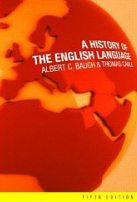
I've been reading A History of the English Language (fifth edition). It's written as an academic survey of, as the title suggests, the history of the english language. Lots of information. Not a lot of flowers. Balanced as it can be.
Previously, my experience in reading about the english language was The Adventure of English by Melvin Bragg. Before that, my understand of english as a language came only from conversations, stories from other people and reflections of my own. The theme was always the same, english is great. I was a language patriot. Like Bragg was in his excellent book, I was an english excectionalist. Still am, really, because english is great. It has a massive lexicon. It's not prescriptive. It's flexible. It takes on new words from other traditions.
It's the last bit i had never really thought about. I blindly assumed it was a virtue. Maybe it is. But, i've recently been swayed by (see photo on right) that the opposite is true.
When a language doesn't have a word for something, there are two options. Modern english usually (though not exclusively) steals. Fiancée is one example. Old English, apparently, did something else. It did what the germans do. It combined words already in the language. Officially, i gather, this phenomenon is called 'self explaining compounds'; I prefer to think of them as double barrel words. A famous one from Old English is 'whale road'. Another one is 'sea wood'. I've always been fond of 'word hoard'.
I love this. It's poetic in a way thievery is not. Words so easily lose their meaning. The more we use the word, the less meaning that word carries with it. Words like 'art' and 'religion' and 'love'... I don't know where they come from, but they are worn out. Our usage in modern english reveals nothing intrinsic about the word, the concept or the speaker. Can I suggest double barreling them? 'Made beauty.' 'Spirit group.' 'See another.' Perhaps not flawless examples, but they reveal what I think of art, religion and love. We can make up the double barrels as we go along, change them every day, even do a triple barrel from time to time. But, as speakers, writers and creatures reliant on culture, we have a responsibility to ensure concepts essential to us never loose their meaning, context or poetry.
Old English ended, roughly, when the french took over. The french, to paraphrase steve martin, have a different word for everything. Hence, I will conclude with advice. If you go do France, don't double barrel their words. They don't get it and they don't like it.
Previously, my experience in reading about the english language was The Adventure of English by Melvin Bragg. Before that, my understand of english as a language came only from conversations, stories from other people and reflections of my own. The theme was always the same, english is great. I was a language patriot. Like Bragg was in his excellent book, I was an english excectionalist. Still am, really, because english is great. It has a massive lexicon. It's not prescriptive. It's flexible. It takes on new words from other traditions.
It's the last bit i had never really thought about. I blindly assumed it was a virtue. Maybe it is. But, i've recently been swayed by (see photo on right) that the opposite is true.
When a language doesn't have a word for something, there are two options. Modern english usually (though not exclusively) steals. Fiancée is one example. Old English, apparently, did something else. It did what the germans do. It combined words already in the language. Officially, i gather, this phenomenon is called 'self explaining compounds'; I prefer to think of them as double barrel words. A famous one from Old English is 'whale road'. Another one is 'sea wood'. I've always been fond of 'word hoard'.
I love this. It's poetic in a way thievery is not. Words so easily lose their meaning. The more we use the word, the less meaning that word carries with it. Words like 'art' and 'religion' and 'love'... I don't know where they come from, but they are worn out. Our usage in modern english reveals nothing intrinsic about the word, the concept or the speaker. Can I suggest double barreling them? 'Made beauty.' 'Spirit group.' 'See another.' Perhaps not flawless examples, but they reveal what I think of art, religion and love. We can make up the double barrels as we go along, change them every day, even do a triple barrel from time to time. But, as speakers, writers and creatures reliant on culture, we have a responsibility to ensure concepts essential to us never loose their meaning, context or poetry.
Old English ended, roughly, when the french took over. The french, to paraphrase steve martin, have a different word for everything. Hence, I will conclude with advice. If you go do France, don't double barrel their words. They don't get it and they don't like it.
 RSS Feed
RSS Feed